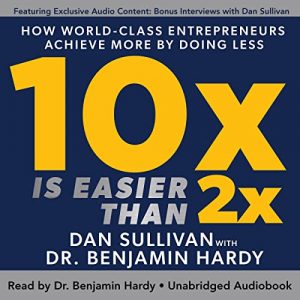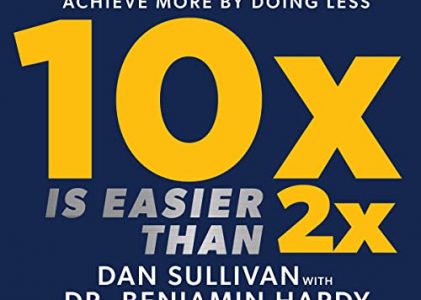
Always make your future bigger than your past – Dan Sullivan
Anyone that reads leadership or entrepreneurship books will love the idea of 10x results…but that certainly doesn’t mean they’ll resonate with the idea that 10x is easier than 2x. Most of us look for incremental ways to improve our businesses. We look for increased efficiencies. We look for ways to add-on to what we’re already doing. Yet, that is exactly the point of this book.
10x is Easier than 2x: How World-Class Entrepreneurs Achieve More by Doing Less is the newest collaborative book from Dan Sullivan and Dr. Benjamin Hardy. Their previous works, The Gap and The Gain and Who Not How have become classics that should be read by leaders and business owners alike. This new book, however, really challenges the reader to step up, believe in their future and take courageous action to achieve extraordinary results.
Ninety-nine percent of people in the world are convinced they are incapable of achieving great things, so they aim for the mediocre. The level of competition is thus fiercest for ‘realistic’ goals, paradoxically making them the most time and energy-consuming. It’s easier to raise $1,000,000 than it is $100,000. It’s easier to pick up the one perfect 10 in the bar than the five 8s. — Tim Ferriss
There is so much in this book to unpack, but if I had to boil it down to a principle that must be understood…it would be the Pareto principle. Sometimes described as the 80/20 rule, the Pareto principle states that for many outcomes, roughly 80% of consequences come from 20% of causes. For us, that means that we need to find a way to focus on the 20% of our work/actions that will drive 80% of our future success. The rest of the actions will just continue to drive minimal improvement. Most of what we do will just get us 2x (or less) results. But…if we can identify our 10x goals, we can also find the corresponding 10x behaviors that will change our lives!
To go 10x, you let go of the 80 percent and put your energy, attention, and resources into the bottleneck, which is the 20 percent. – Dan Sullivan

